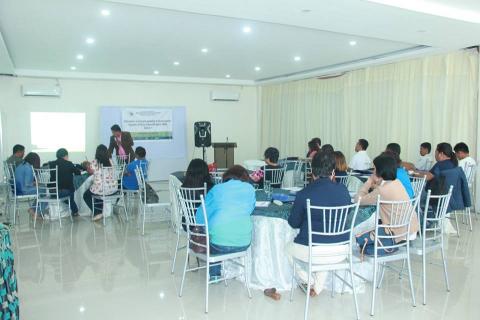Participants listening to the RP, Mr. Jesus Lasmarias
MALAYBALAY CITY- The signing of RA 11203 or the Rice Tariffication Law has resulted to apprehensions by the rice farmers including those in Northern Mindanao. The law which eliminates quantitative restrictions in importation is expected to reduce the cost of rice in the market since imported rice are priced low. Cheaper rice is advantageous to consumers but could be a threat to our rice farmers.
To address these apprehensions, ATI believes that rice farmers should look for more innovative ways to reduce the cost of production, increase yield and improve quality of their rice to make it more competitive. Thus, the System of Rice Intensification (SRI) training was conducted. The SRI Training yielded graduates composed of twenty eight (28) Agricultural Extension Workers and two (2) Farmers. These graduates are expected not only to share their knowledge but also to apply it in their own farms or that of the demo farms in their respective Local Government Units. The Resource Persons were from SRI Pilipinas.
The System of Rice Intensification is not a technology but a methodology aimed at increasing quality rice yield while reducing production cost. It uses less water and eliminates the use of inorganic fertilizers and chemicals which are harmful to the environment. It uses younger seedlings singly spaced. It uses the hand weeder not only for weeding but for aeration purposes. However, it is labor intensive.
SRI is expected to produce rice that are more competitive in the market in terms of price per kilo and the quality of rice since it is produced organically or with zero pesticides, at the very least. SRI is also a climate change mitigation strategy.
The cost of rice production in the Philippines, ranges from P12-14/ kl while our Asian neighbors like Vietnam and Thailand ranges only from P5-8/ kl. (with reports from Jhoylie Mae C. Rosales-Caumban, DMO-II)

